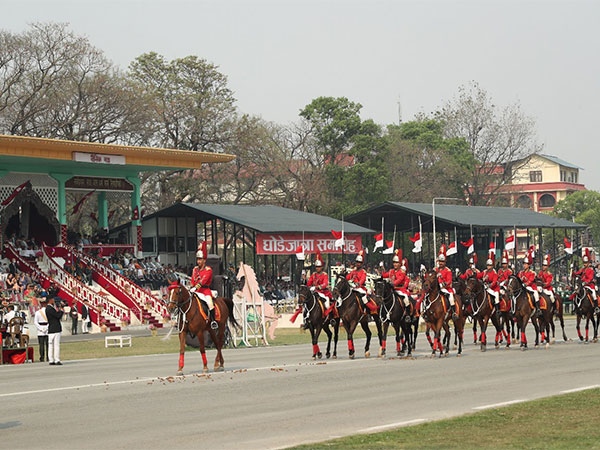
Kathmandu: Nepal on Monday observed, Ghode Jatra, the horse racing day with over 60 horses showcasing dozens of moves and stunts in the army pavilion.
Organised annually by the Nepal Army Cavalry, the Ghode Jatra celebration in Kathmandu is attended by the President, Vice-President, Prime Minister and other high-level officials.
Nepal annually marks Ghode Jatra on the day of Chaitra Krishna Aunsi as per the lunar calendar. In the Nepali language, 'Ghode' refers to 'of horses', and 'Jatra' refers to a type of festival. So, combining these terms, Ghodejatra is meant to be a festival of horses or a horse festival.
In general, Ghode Jatra is considered a Jatra (festival) of the Newa community. But, the Jatra of horsemanship and jubilant festivities is observed by everyone inside and outside the Kathmandu valley.
The horse parade is also religiously known as the Aswa Yatra and is organised by the locals of the valley to welcome the New Year as well.
Going back to cultural beliefs, Ghode Jatra started as a celebration of the victory over a demon named Gurumapa (also called Tundi) in ancient times. He used to terrorise people in the Kathmandu valley, cause misery, kidnap children and devour them.
The demon was finally trampled to death by horses and buried under a tree in the Tundikhel ground at the centre of Kathmandu. To stop his spirits from coming back into the ground, the king started the ritual of galloping over the field. This tradition then was performed every year on Chaitra Krishna Aunsi known as Ghode Jatra.
Apart from this, another belief that prevails states that during the regime of King Pratap Malla of Kathmandu around 787 BCE, the horse procession was only observed in the Kathmandu valley.
Kathmandu, Patan, and Bhaktapur were different states ruled by different kings, and the relationship between the states and kings was also not good. Since the people of Patan used to come to Kathmandu to see the horse procession, King Srinivas Malla of Patan started the horse procession in Bholakhya village of Patan so that the people of Patan do not go to see the horse procession in Kathmandu. In this way, the festival started celebrated with great joy in Patan (Lalitpur) also.
Similarly, the farmers of the valley sow the seeds of vegetable crops like beans and cucumber in their fields as a celebration of the Ghode Jatra welcoming the Nepali New Year.